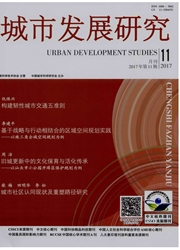

 中文摘要:
中文摘要:
建设和谐宜居城市是未来中国所有城市发展的共同目标导向。在回顾国内外宜居城市研究与评价的基础上,对宜居城市、和谐宜居城市、和谐宜居之都和国际一流的和谐宜居之都等概念内涵进行了科学解析,在此基础上构建了“国际一流的和谐宜居之都”评价指标体系,共包括“城市安全、生活品质、环境宜人、社会和谐、开放创新”5个维度14个要素层和35个具体指标。最后,基于此评价指标对北京建设国际一流的和谐宜居之都水平进行了实证研究。
 英文摘要:
英文摘要:
Livable cities construction has been a common target among all Chinese cities. Based on literature review regarding livable cities, this study decomposed livable cities related concepts gradually including livable cities, cities of harmony and livability, metropolises of harmony and livability, and specifically defined the scientific connotation of world-class metropolis of harmony and livability. Furthermore, the study built an evaluation index system of world-class metropolis of harmony and livability from five dimensions, including city safety, life quality, natural environment, social harmony and open innovation, which can be further subdivided into 14 element layers and 35 specific indicators. At last, an empirical analysis was conducted based on the evaluation index system to provide a better understanding on current construction of world-class metropolis of harmony and livability in Beijing. Our findings can not only enrich the theory of world-class metropolis of harmony and livability but also provide scientific suggestions for the construction' practice.
 同期刊论文项目
同期刊论文项目
 同项目期刊论文
同项目期刊论文
 期刊信息
期刊信息
